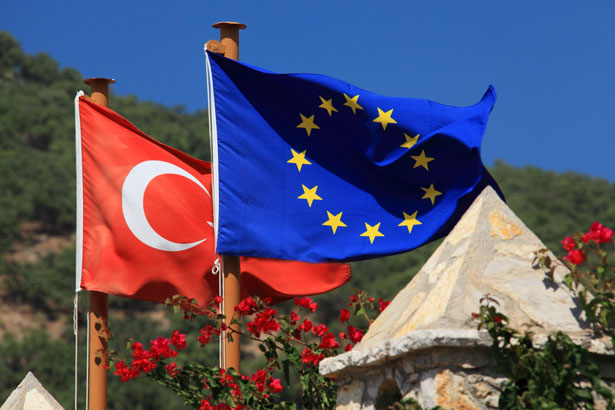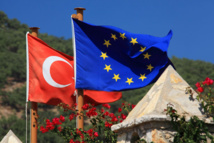There will be no problems with the first position: Germany gained experience in negotiations with Greece. Recently, it was confirmed in Frankfurt, where the politicians decided to expand the QE to 20 billion euros per month. Simply put, Berlin will find 6-7 billion euros for Ankara somewhere. The second point is also quite simple: it’s possible to promise to radically speed up Turkey's application for EU membership. However then, when the situation of migrants cease to be critical, it’ll be also easy to newly erect insurmountable bureaucratic barriers for Ankara once again.
What is the most problematic? The third paragraph. By early July 2016 at the height of tourist season, all 78 million Turks should have gotten right to visa-free entry into any EU country - without all the issues, constraints and additional requirements. Europe, in turn, is not the best mood to take hundreds of thousands of new visitors, each of which may be a radical and religious fanatic.
Amanda Paul, a senior analyst at European Policy Centre, said that Turkey found itself in a difficult situation due to the escalation of the conflict with the Kurds. Yet, it’s clear that Europe, overloaded with refugees, is more desperate here. All Brussels’ diplomacy will be based on this in the next two days.
By Thursday, all 28 EU leaders will need to develop a common proposal for Turkey. Prime Minister Ahmet Davutoglu will arrive in Brussels on Friday and consider it. According to Donald Tusk, head of the European Council, there is still a lot of controversies to settle before the meeting with the Turkish prime minister.
All attention is now focused on Angela Merkel. Anti-immigration party AfD burst to power in three major lands of Germany, and the Chancellor must show that she can somehow manage the flow of refugees. Mrs. Merkel finally explained the essence of her suspicious plan of exchange. The "bad" migrants, who assailed the coast of Greece in rubber boats, will be sent back home. "Good" refugees, who have a minimum of required documents and are waiting in Turkey, will be accepted in the EU. Apparently, that does not alter the particularity of the fact. Angela Merkel will spend hundreds of millions of euros on transport costs, and the total number of migrants in Europe will remain the same. Portal statewatch.org already called it "extraordinary carousel of refugees."
Any negotiations with Turkey, particularly on joining the EU, are complicated by the presence of Cyprus. Officially, all the 28 countries of the Union are absolutely equal - even a small island nation. Cyprus’ Foreign Minister Ioannis Kasoulides could not express position on topical issues clearer: "Yes to Europe, no to Turkey!".
There are difficulties with the visa-free regime, too. The French President is very categorical: Turkey must meet all 72 criteria of the EU (include biometric passports, and much more) before consideration of the issue. According to European Commission estimates, Turkey have met only 19 of them so far. Bavarian allies of Merkel, the CSU party, are also strongly opposed to the visa liberalization. The chancellor has to listen to them: AfD and "greens" are coming on all fronts - losing the support of CSU in such a situation would be, to put it mildly, unwise.
source: bbc.com
What is the most problematic? The third paragraph. By early July 2016 at the height of tourist season, all 78 million Turks should have gotten right to visa-free entry into any EU country - without all the issues, constraints and additional requirements. Europe, in turn, is not the best mood to take hundreds of thousands of new visitors, each of which may be a radical and religious fanatic.
Amanda Paul, a senior analyst at European Policy Centre, said that Turkey found itself in a difficult situation due to the escalation of the conflict with the Kurds. Yet, it’s clear that Europe, overloaded with refugees, is more desperate here. All Brussels’ diplomacy will be based on this in the next two days.
By Thursday, all 28 EU leaders will need to develop a common proposal for Turkey. Prime Minister Ahmet Davutoglu will arrive in Brussels on Friday and consider it. According to Donald Tusk, head of the European Council, there is still a lot of controversies to settle before the meeting with the Turkish prime minister.
All attention is now focused on Angela Merkel. Anti-immigration party AfD burst to power in three major lands of Germany, and the Chancellor must show that she can somehow manage the flow of refugees. Mrs. Merkel finally explained the essence of her suspicious plan of exchange. The "bad" migrants, who assailed the coast of Greece in rubber boats, will be sent back home. "Good" refugees, who have a minimum of required documents and are waiting in Turkey, will be accepted in the EU. Apparently, that does not alter the particularity of the fact. Angela Merkel will spend hundreds of millions of euros on transport costs, and the total number of migrants in Europe will remain the same. Portal statewatch.org already called it "extraordinary carousel of refugees."
Any negotiations with Turkey, particularly on joining the EU, are complicated by the presence of Cyprus. Officially, all the 28 countries of the Union are absolutely equal - even a small island nation. Cyprus’ Foreign Minister Ioannis Kasoulides could not express position on topical issues clearer: "Yes to Europe, no to Turkey!".
There are difficulties with the visa-free regime, too. The French President is very categorical: Turkey must meet all 72 criteria of the EU (include biometric passports, and much more) before consideration of the issue. According to European Commission estimates, Turkey have met only 19 of them so far. Bavarian allies of Merkel, the CSU party, are also strongly opposed to the visa liberalization. The chancellor has to listen to them: AfD and "greens" are coming on all fronts - losing the support of CSU in such a situation would be, to put it mildly, unwise.
source: bbc.com



















